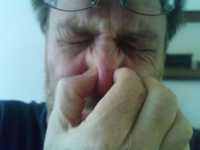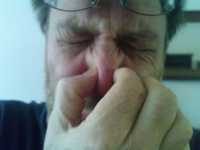
17 Aug Who Suffers From Phantom Smells?
MedicalResearch.com Interview with:
 Kathleen Bainbridge, PhD
Kathleen Bainbridge, PhD
Epidemiology and Biostatistics Program
NIDCD
MedicalResearch.com: What is the background for this study? What are the main findings?
Response: The causes of phantom odor perception are not understood. This study looked for the prevalence and risk factors for this disorder. We found that that 1 in 15 Americans (or 6.5 percent) over the age of 40 experiences phantom odors.
This study, is the first in the U.S. to use nationally representative data to examine the prevalence of and risk factors for phantom odor perception. The study included about 7,400 adults who participated in the National Health and Nutrition Examination Survey, a continuous survey conducted by the National Center for Health Statistics which is part of the Centers for Disease Control and Prevention. The study could inform future research aiming to unlock the mysteries of phantom odors.
We identified risk factors that may be related to the perception of phantom odors. People are more likely to experience this condition if they are female, and are relatively young—we found a higher prevalence in 40-60 year-olds compared to 60+ year-olds. Other risk factors include head injury, dry mouth, poor overall health, and low socio-economic status. People with lower socio-economic status may have health conditions that contribute to phantom odors, either directly or because of medications needed to treat their health conditions.
MedicalResearch.com: What should readers take away from your report?
Response: People should understand that the sense of smell is an important part of our overall health.
MedicalResearch.com: What recommendations do you have for future research as a result of this work?
Response: Our group has been looking further as to what types of medical conditions seem to correlate with phantom odor perception, and also investigating the role of medications.
Other researchers could also examine questions related to this work. For instance, researchers could further characterize people’s individual experience with phantom odors – for example, how often phantom odors occur and what triggers the sensation. Researchers could also examine what motivates people to seek treatment for phantom odors or smell disorders. Lastly, researchers could delve into the biological mechanisms that underlie phantom odor perception.
MedicalResearch.com: Is there anything else you would like to add?
Response: No, but thank you for your interest in this topic. I have no disclosures.
Citation:
[wysija_form id=”3″]
[last-modified]
The information on MedicalResearch.com is provided for educational purposes only, and is in no way intended to diagnose, cure, or treat any medical or other condition. Always seek the advice of your physician or other qualified health and ask your doctor any questions you may have regarding a medical condition. In addition to all other limitations and disclaimers in this agreement, service provider and its third party providers disclaim any liability or loss in connection with the content provided on this website.
Last Updated on August 17, 2018 by Marie Benz MD FAAD
